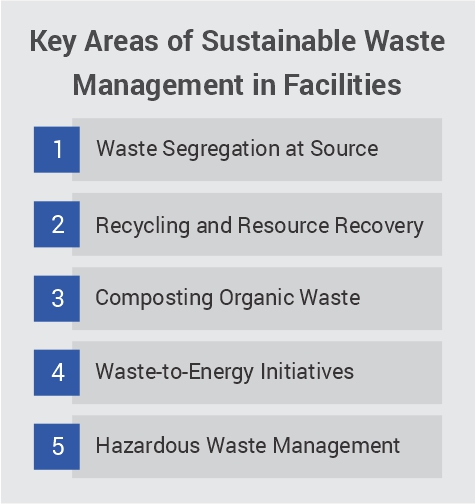This blog explores how sustainable waste management is transforming facilities across industries. It highlights practical strategies used by Facility Management Companies India and Food Catering Services India to reduce waste, cut costs, and meet ESG goals. From smart segregation to composting in Food Services India, it shows how top facility management companies integrate eco-friendly practices into daily Maintenance and Operations India, driving a greener future for facilities and management nationwide.
Role of Sustainable Waste Management in Facilities
In today’s rapidly evolving industrial and commercial landscape, sustainability is no longer an optional commitment—it’s a business imperative. Among the many aspects that contribute to a sustainable facility, waste management stands out as one of the most critical yet often overlooked pillars. From manufacturing plants to corporate offices and industrial kitchens, the way waste is managed directly impacts environmental footprints, operational costs, and regulatory compliance.
In this blog, we explore how sustainable waste management plays a vital role in facilities and management, the strategies leading Facility Management Companies India are adopting, and how the integration of these practices is driving a greener future for industries across the country.
Understanding Sustainable Waste Management in Facilities
Sustainable waste management goes beyond mere collection and disposal. It encompasses the entire life cycle of waste—from generation and segregation to recycling, reuse, and safe disposal. For Facility Management Solutions providers, embedding sustainability in waste handling means designing processes that reduce waste at the source, recover value through recycling, and divert maximum waste away from landfills.
Whether it’s a corporate campus, manufacturing plant, educational institution, or Food Services India kitchen, every facility generates waste streams that, if managed efficiently, can significantly reduce environmental impact and operational expenditure.
Why Sustainable Waste Management Matters
Environmental Responsibility
Facilities are significant waste generators. Industrial units, commercial buildings, and large-scale kitchens producing Catering Food India all generate various forms of waste—solid, liquid, and even hazardous. Unsustainable disposal leads to land, water, and air pollution. By embracing sustainable waste management, facilities contribute to a circular economy, conserve natural resources, and mitigate climate change.
Compliance and Reputation
With tightening environmental regulations, sustainable waste practices are essential for compliance. Non-compliance not only leads to penalties but also affects a company’s reputation. Top facility management companies understand this and make sustainable waste management a core service offering.
Cost Efficiency
Waste disposal comes with a cost. By minimizing waste at source and maximizing recycling, facilities can significantly reduce disposal expenses. Many companies also generate revenue streams by recycling certain materials.
Employee Engagement
An organization that visibly cares about sustainability motivates employees to adopt environmentally responsible behaviours both inside and outside the workplace. Well-planned waste management programs make this possible.
Key Areas of Sustainable Waste Management in Facilities

Waste Segregation at Source
The most basic yet vital principle is segregation. Facilities must have clear processes for separating biodegradable, recyclable, and hazardous waste at the point of generation. This is especially critical in Food Catering Services India, where organic waste from kitchens can be converted into compost or bioenergy if segregated properly.
Recycling and Resource Recovery
Facilities should partner with authorized recyclers for materials like paper, cardboard, plastics, metal scraps, and e-waste. Some Facility Management Companies India also deploy onsite compactors, shredders, and balers to reduce the volume of recyclables, lowering transport costs and carbon emissions.
Composting Organic Waste
For facilities with large food operations, like industrial canteens and corporate cafeterias, composting is a game changer. Instead of sending food scraps to landfills, they can be converted into valuable compost for landscaping or horticulture projects within the facility. Many Facility Management Solutions providers integrate onsite composting units as part of their green services.
Waste-to-Energy Initiatives
Advanced facilities and top facility management companies are exploring waste-to-energy (WtE) technologies that convert non-recyclable waste into energy. This not only reduces the burden on landfills but also supports a facility’s energy needs.
Hazardous Waste Management
Facilities in sectors like manufacturing, pharmaceuticals, or chemicals generate hazardous waste that requires specialized handling and disposal. Partnering with licensed vendors and following strict compliance measures ensures safety for people and the environment.
Sustainable Waste Management: Best Practices by Leading Facility Managers
Top facility management companies are setting benchmarks by embedding sustainability into every stage of their operations. Here are some practical best practices:
Training and Awareness:
Employees, housekeeping staff, and kitchen teams must be educated on waste segregation norms. Visual signage and regular training make sustainable waste practices easy to adopt.
Smart Bins and IoT Solutions:
Many modern facilities are deploying smart bins with sensors to monitor waste levels and optimize collection schedules. Data-driven waste management improves efficiency and reduces overflow incidents.
Integrated Waste Management Plans:
A comprehensive waste management plan covers audits, waste reduction strategies, vendor management, and regular monitoring. This aligns waste practices with broader Maintenance and Operations India strategies.
Collaboration with Food Service Teams:
In industrial kitchens, food wastage can be minimized by smart menu planning, portion control, and using surplus food for community initiatives. Food Services India leaders are adopting these measures to minimize waste while ensuring nutritious meals.
The Role of Facility Managers in Driving Sustainable Waste Management
Facility managers play a pivotal role in translating sustainability goals into actionable outcomes. Their responsibilities include:
- Conducting waste audits to identify waste generation patterns and potential areas for reduction.
- Engaging with vendors to ensure compliance with recycling and disposal norms.
- Monitoring performance and setting realistic waste diversion targets.
- Reporting progress transparently to clients and stakeholders.
- Innovating with technologies like waste tracking systems, compactors, and bio-digesters.
By aligning waste management goals with overall facilities and management strategies, facility managers add immense value to the organization and the environment.
Sustainable Waste Management in Industrial Catering: A Case in Point
Consider an industrial catering unit serving thousands of meals daily. Such facilities contribute significantly to food waste if not managed wisely. Here’s how Food Catering Services India leaders are setting examples:
- Source Locally and Plan Menus Smartly: Reducing wastage starts with procurement. Sourcing fresh, local ingredients and planning menus based on seasonal availability reduces spoilage.
- Repurpose Food Waste: Kitchen trimmings and scraps can be composted. Some companies donate surplus edible food to local communities, ensuring nothing goes to waste.
- Responsible Packaging: Leading catering units avoid single-use plastics and switch to biodegradable packaging wherever possible.
- Regular Audits: Periodic checks help identify new opportunities to reduce food wastage.
How Sustainable Waste Management Supports ESG Goals
Environmental, Social, and Governance (ESG) reporting is increasingly becoming mandatory for large organizations in India. Sustainable waste management practices support ESG goals in multiple ways:
- Environmental Impact: By reducing landfill contributions and carbon emissions.
- Social Impact: By creating awareness, generating employment in recycling sectors, and supporting community initiatives.
- Governance: By ensuring compliance with environmental laws and reporting metrics transparently.
Challenges in Implementing Sustainable Waste Management
While the benefits are clear, implementation comes with its challenges:
- Behavioral Change: Convincing staff and vendors to follow segregation rules consistently can be difficult.
- Infrastructure Investment: Setting up composting units or waste-to-energy plants requires upfront investment.
- Vendor Reliability: Choosing certified recyclers and disposal partners is crucial to ensure waste is handled responsibly.
These challenges, however, are not insurmountable. Top facility management companies overcome them with clear policies, robust training, and constant stakeholder engagement.
The Future: Innovation and Collaboration
The future of sustainable waste management will be shaped by innovation and collaboration. Emerging trends include:
- Zero Waste to Landfill Initiatives: Many multinational companies in India are pledging to achieve zero landfill status for their facilities.
- Circular Economy Partnerships: Collaborations with startups and recycling firms are unlocking new solutions for material recovery.
- AI and Data Analytics: Advanced data tools are helping facility managers track waste streams and identify new efficiencies.
As the industry grows, companies offering Facility Management Solutions that embed sustainability will stand out as trusted partners for clients seeking greener operations.
Conclusion
Sustainable waste management is an integral part of modern facilities and management. From corporate campuses to industrial kitchens serving Catering Food India, responsible waste practices are shaping a cleaner, greener future for all. As one of the top facility management companies, your commitment to sustainability can differentiate your brand, cut costs, ensure compliance, and strengthen your ESG performance.
If you’re looking to transform your waste management practices with industry-leading Facility Management Companies India, robust Food Services India, or responsible Food Catering Services India, now is the time to act.
Partner with experts in sustainable waste management—reach out to us today to learn how our customized solutions can help your facility achieve its sustainability goals while ensuring seamless Maintenance and Operations India. Together, let’s build a future where waste is a resource, not a burden.
Contact us today and take the first step towards a cleaner, greener tomorrow!
Industries we serve:
Automobile | Ancillary | Manufacturing | Pharmaceutical | Healthcare | Oil and Gas | FMCG | Education | Real Estate | Commercial
Also read: The Role of Robotics in the Future of Facility Management

